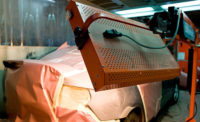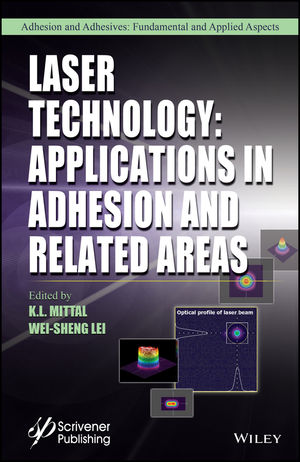SUNY-ESF Leads National Initiative to Provide Workforce Training in Radiation Curing

SYRACUSE, NY - According to recent statistics from the New York State Department of Labor, a workforce shortage in radiation curing exists in New York State despite the fact that nearly 1,000 chemists with bachelor's degrees were seeking employment in the state. The Radiation Curing Program (RCP) at the State University of New York College of Environmental Science and Forestry (SUNY-ESF) aims to address this disconnect by providing specific job skills for individuals seeking careers in related fields, practicing industry professionals, upper-level undergraduate and graduate students, and recent graduates.
The new online program offered through SUNY-ESF will provide specialized training to address workforce shortages in the field of radiation curing, also known as energy curing. The RCP is a response to nationwide demand for training and education related to this growing technology.
According to The Global Radiation Cured Products Industry market report, produced by Kusumgar, Nerlfi & Growney Inc. in the spring of 2013, the industry has grown from an emerging technology just three or four decades ago to an industry in which radiation-cured products achieved global sales of 868 million pounds in 2012, worth $4.94 billion. The report notes that “growth of the technology is significantly higher than the coating, ink and adhesive industries and is being propelled by productivity, performance and environmental benefits compared to more traditional technologies.” The technology is currently well established in a number of large-volume applications, and new applications are being developed that are augmenting growth.
The SUNY-ESF program comprises three online courses and an Advanced Certificate, with curriculum jointly developed by a team of academic and experienced industry practitioners to reflect current and emerging applications. It is a collaboration among SUNY-ESF; RadTech International North America, a nonprofit organization dedicated to the advancement of ultraviolet and electron beam technologies; CenterState CEO; the Manufacturers Association of Central New York (MACNY); and other organizations. It is supported in part by a U.S. Department of Labor, Employment and Training Administration H-1B Technical Skills Training Grant.
Dan Montoney, an adjunct professor in the program and the Chief Technology Officer/Owner of Rapid Cure Technologies, attended SUNY-ESF for his graduate work and has worked with the university on projects involving environmentally friendly chemistries and technologies. He noted that the university has worked with business and with the New York State Energy Research and Development Authority (NYSERDA) – a state organization that helps fund technologies that have environmental benefits and create clean-energy jobs for New York – to promote the use of radiation-cure technologies. “When the H-1B visa grant became available, I brought it to their attention that there was a need for trained and educated employees because they are not easy to find or come by.”
“We are looking for people that have what I consider a basic training in the technology, that is, understanding the chemistry, the process, the equipment. … We are making a point as a company, as a person and as a collaborative group from the university standpoint to really start educating people at the collegiate level and even to the high school level that these technologies exist and that there are good careers in them,” said Montoney.
The program’s online approach is designed to be user-friendly, flexible and convenient. Central New York participants will have additional opportunities for course-related demonstrations and site visits to the UV/EB Process Curing Systems Technology Center on the SUNY-ESF campus and the laboratory at Rapid Cure Technologies, which is a formulator and manufacturer of environmentally friendly rapid-cure chemistries and processes based in Syracuse.
Montoney sees the program as an opportunity to develop and train employees about radiation curing and how to use it. “If a company, for example, is already using the technology, this can help them understand it better, learn how to troubleshoot and think about ways to use it better.” He noted that participation in the program can help potential end users and new technology developers teach their employees how to actually formulate these products, allowing companies to develop under their own intellectual property umbrella. This gives companies the ability to do more with their own resources, whether by utilizing the technology better or by utilizing the technology to develop more products and technologies.
Montoney sees the economic potential that radiation curing offers the state as a tool to bring manufacturing back to New York, helping companies become more competitive and efficient, which allows them to operate more successfully in the state. He noted, that while there are many commercial applications in which radiation-cure technology has been used, “there is still a lot of room for growth for the technology in other applications and in established applications, as well as the development of the technologies.”
In Central New York, the CenterState Corporation for Economic Opportunity (CEO) Clean Tech Center is funding an incentive program to enable employees at Central New York businesses that use radiation or energy curing in their manufacturing processes to take one or more RCP courses at no cost.
The three RCP course offerings in Spring 2014 are: Introduction to Polymer Coatings (Feb. 3-April 18), Radiation Curing of Polymer Technologies (Feb. 17-May 2), and Radiation Curing Equipment, Instrumentation and Safety (Feb.17-April 18).
Registration is now open. For more information, visit www.esf.edu/outreach/radcuring or contact Chuck Spuches, Associate Provost for Outreach at SUNY-ESF, at 315/470.6810.
Looking for a reprint of this article?
From high-res PDFs to custom plaques, order your copy today!







